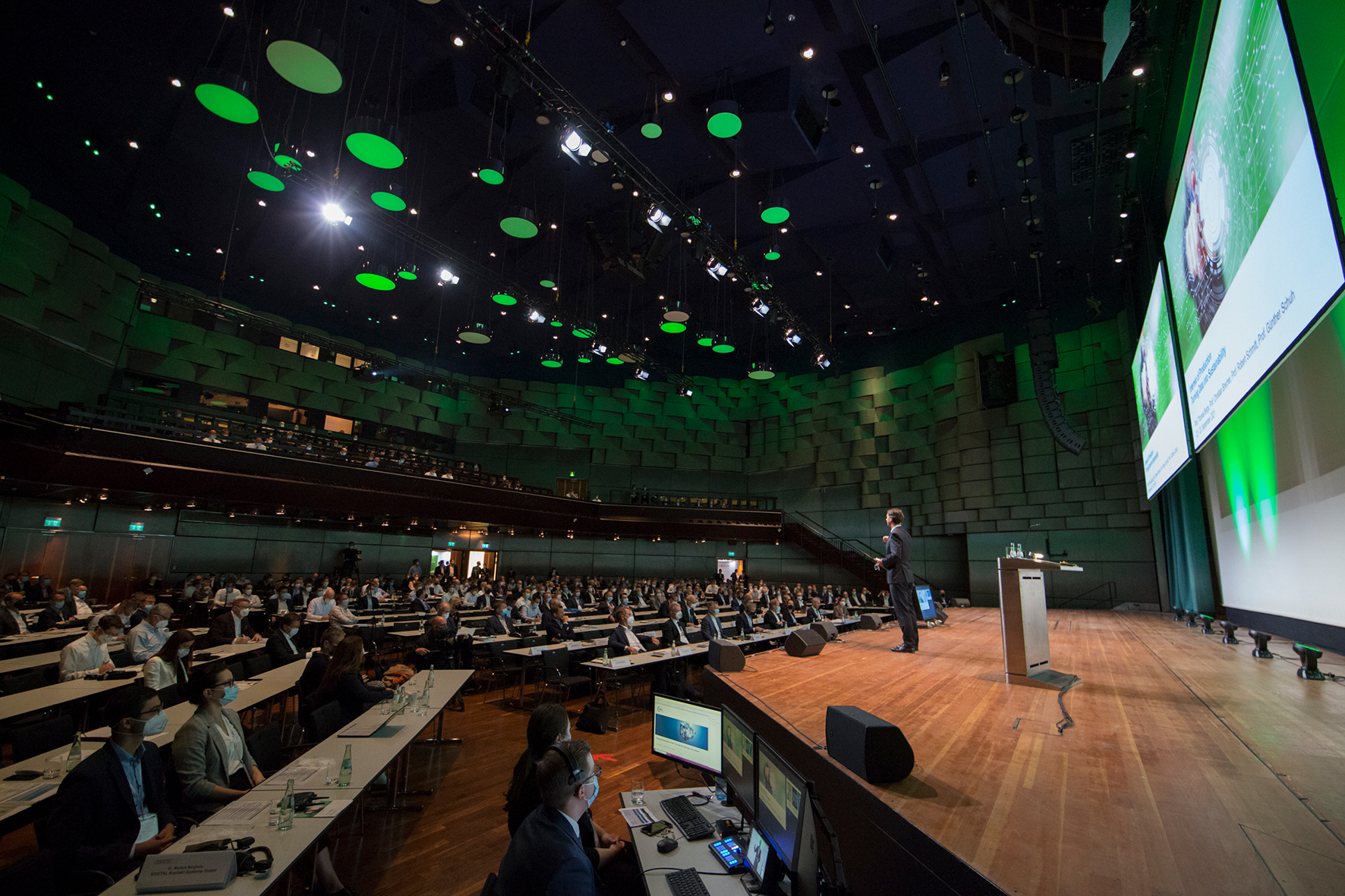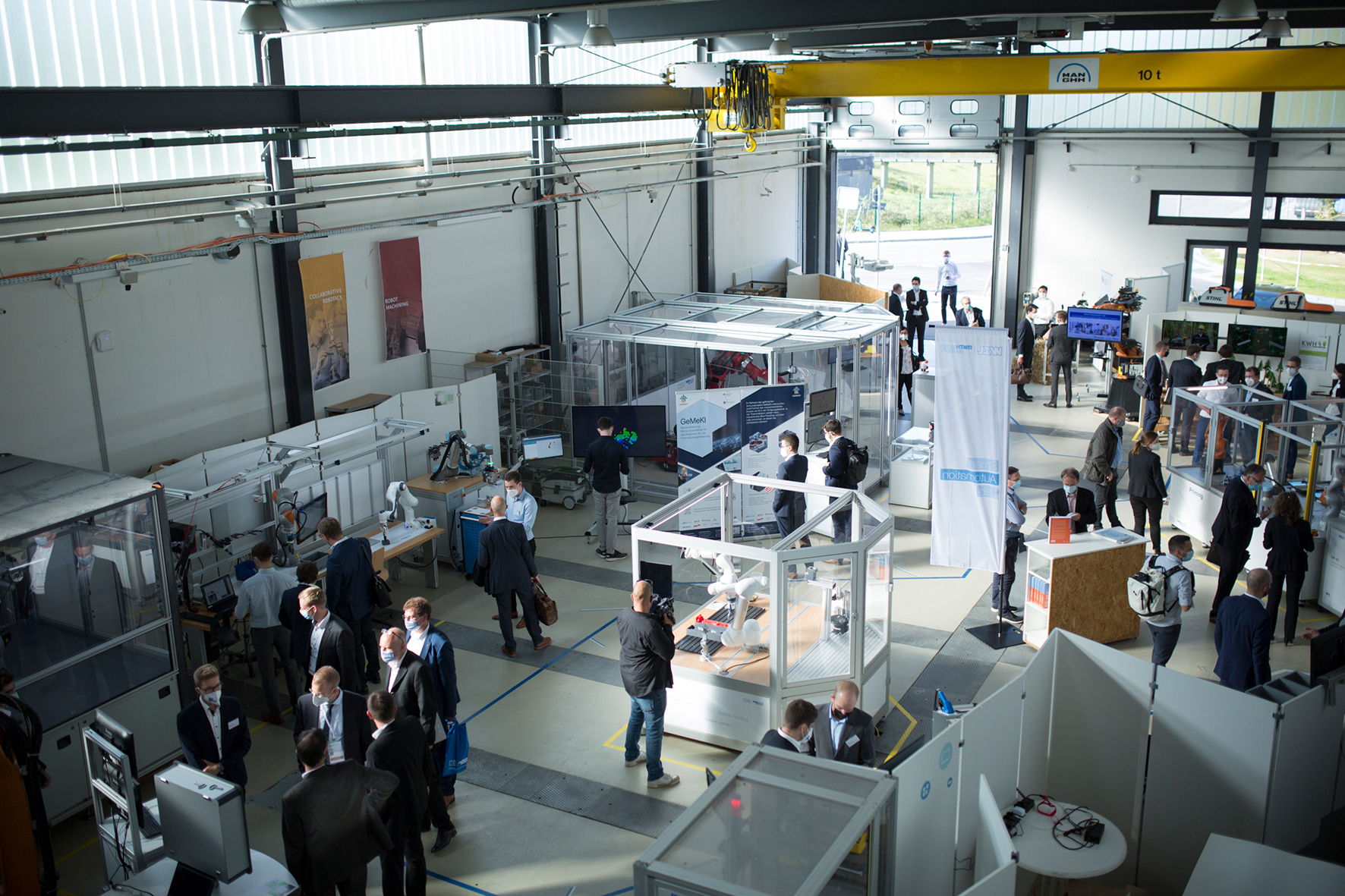Creating value rather than growth: Aachen institutes announce the production turnaround
“Instead of growth, we must focus on values!” – this statement by BASF executive Saori Dubourg is what participants of the 30th Aachen Machine Tool Colloquium (AWK) took home on September 23, 2021. More than 1,400 specialists and executives from the management levels of the manufacturing industry had followed the call of the Laboratory for Machine Tools and Production Engineering (WZL) of RWTH Aachen University and the Fraunhofer Institute for Production Technology IPT to the traditional network meeting: After a postponement due to the coronavirus, the AWK took place with the motto “Internet of Production – Turning Data into Sustainability” as one of the first large face-to-face events on-site in Aachen and simultaneously as an online conference.


The organizers' aim with AWK'21 was to spark a discussion on values in production technology: After the colloquium, initially planned under the heading “Turning Data into Value”, had to be postponed twice, it had been possible to focus the topic more strongly and with a targeted view to sustainable value creation. The question of how companies can secure their future competitiveness through sustainable and resilient production ran like a thread through all the presentations, discussions and exhibitions at the Aachen Eurogress and the two hosting institutes.
The four leading minds in Aachen production technology, professors Thomas Bergs, Christian Brecher, Robert Schmitt and Günther Schuh, believe that the catalyst for the urgently demanded production turnaround is not only the current discussion of values in society but also the resulting shift in the capital market – from a purely financial view of productivity to a stronger focus on the sustainability of products and services and the associated manufacturing processes. They name the Internet of Production as the most important enabler of this production turnaround: the end-to-end digitization and networking of machines and plants within the production and value chain.
Sustainability is already being practiced in various industries
Speakers who have already successfully taken this path with their companies showed how sustainability can work in industrial practice: As an example for the future of the metal industry, Professor Katja Windt from the SMS Group showed a path to decarbonized steel production. In her presentation, she pointed out the connections between a reduction in CO2 emissions through hydrogen technology and the digitalization of blast furnace processes, which can ultimately lead to new, hybrid business models.
Lars Wagner, COO of MTU Aero Engines AG, spoke about the potential that could be created by new and improved propulsion concepts in aviation. With the aim of manufacturing both conventional engine models and new, fuel cell-based propulsion systems, Wagner presented an excerpt from the company's digitization strategy, ranging from AI-supported simulation to predictive maintenance. With a view to the rapid implementation of global climate targets, he emphasized the importance of close cooperation in innovation networks.
Focusing on environmental, social and economic value
Saori Dubourg, member of the Executive Board of BASF SE, explained that – not at least due to increased customer requests – sustainability must become “the new normal.” Market demand, as well as political constraints such as the European Green Deal, will accelerate the trend and drive companies toward transformation sooner or later. Dubourg strongly advocated that the economic risks posed by climate change and their significance for industry should no longer be underestimated: A paradigm shift from shareholder value to a new value proposition that values the environment, society and the economy together is well underway, she said. ”Long-term success means creating value for environment, society and economy,” Dubourg emphasized in her closing remarks, which were later echoed again and again by other speakers in their own words.
On the road to a sustainable production of the future
”We are facing a production turnaround: How, where and what will we produce in the future?” was how Professor Thomas Bergs, holder of the Chair of Manufacturing Technology at WZL of RWTH Aachen University and member of the Board of Directors at Fraunhofer IPT, summarized the new key issues in production. The sustainability of manufacturing process chains is becoming an essential variable for evaluation, Bergs said. ”How must sustainable production cycles be organized in a global economy? And what regulatory mechanisms can and should be in place to control resource consumption? Undoubtedly, there will be entirely new products and manufacturing technologies.” Much remains to be done in this area, he said, and conferences such as AWK'21 could help to start a conversation with those involved about the conditions under which production could be shaped in the future.
Both the Aachen researchers and the invited speakers saw solutions in digital technologies for networking, such as edge cloud and 5G mobile technology, in artificial intelligence and the digital twin of product and production. These technologies are already in use in companies today and their further development is receiving high attention in production research.
Visitors to AWK'21 were also able to take a look inside the laboratories and machine shops that are part of the future of production technology on both days of the event: A strict hygiene concept made it possible to show participants on site in the institutes what the Aachen scientists are already working on today. A special highlight for many visitors was the tour of the new, 2,400-square-meter Machine Hall of the WZL, which, after the devastating fire in February 2016, could finally be reopened this year with more than 70 test benches.
A total of 800 participants followed the digital program live on the screens and were also able to navigate through the machine halls of the two hosting institutes in the world's largest virtual institute tour. Exclusively for the digital audience, Professor Thomas Prefi from umlaut SE and Dr. Tilman Buchner from The Boston Consulting Group GmbH discussed the topic ”Networked data in production – duty of the future or a freestyle?”
At the end of the event, Professor Robert Schmitt, holder of the Chair of Production Metrology and Quality Management at the WZL and member of the Fraunhofer IPT board of directors, gave an outlook on the next AWK. On May 11 and 12, 2023, industry and science will meet again in Aachen – working title: “Technologies for CO2 Neutrality”.
About the Aachen Machine Tool Colloquium
The Aachen Machine Tool Colloquium is both a network meeting and an information hub at the same time. Participants from different disciplines traditionally meet every three years in Aachen to exchange ideas about the production of tomorrow. In addition to the usual face-to-face event, there was a premiere at the 30th Aachen Machine Tool Colloquium: Besides the analog event in the Aachen Eurogress, large parts of the event program were transmitted digitally. In two times two parallel lecture sessions the participants learned first-hand about the results of applied research and the practical implementation in production. The four sessions each comprised several presentations on the topics of ”Architecture of Networked, Adaptive Production”, ”The Digital Twin in the Production Cycle”, ”Data Sciences in Production” and ”Sustainable Productivity”.